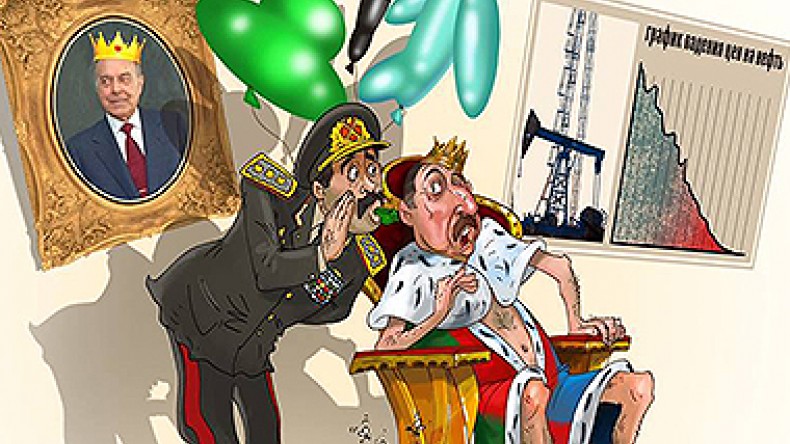
What services do the generals provide to Aliyev?
by Armen Minasyan, political scientist
The situation has stabilized in recent days on Armenian-Azerbaijani border and the line of contact, but there are all preconditions to believe that flare-ups will continue.
The OSCE Minsk Group Co-chairs who seek to encourage a peaceful resolution to the Karabakh conflict published on October 29 yet another statement following their regional trip. The only valuable piece of information in the statement is that the Presidents of Armenia and Azerbaijan confirmed their commitment to hold a summit under the auspices of the Co-chairs before the end of the year. As regards tensions reported in September and October, the Co-chairs once again confined themselves to condemning tensions as unacceptable.
It should be noted that as far as border incidents are concerned, the Ilham Aliyev regime is more honest than the Co-chairs committed to political correctness. Ilham Aliyev and his regime have never denied, in fact, they even confirmed in their public remarks that incidents are a result of Azerbaijan’s initiative, while the mediators cannot take a final decision regarding that issue.
Anyway, it is no use expecting super efforts from the mediators, especially as they said and continue to say that it is up to the sides to seek a solution, while their mission is assisting them.
In this context it is essential for the Armenian side to understand the motives behind Azerbaijan’s behavior, rather than criticize the conduct of the mediators. Unfortunately there is no final diagnosis here, which allows the Aliyev regime to continue its ‘provocative initiatives’.
The prevailing opinion in Armenia and to some extent in the international community is that by regularly launching provocations – very often resulting in the loss of human life – the Azerbaijani side is trying to show that the conflict is not ‘frozen’. Although this thesis is well-grounded and largely corresponds to reality, we are inclined to think that it is just a derivative effect, and the cause of provocations is much deeper.
The point is that when considering the Karabakh problem – especially from the viewpoint of the Azerbaijani authorities - we often mistakenly believe that Aliyev and his subordinates wage a selfless struggle to ‘restore historical justice’, which naturally also means advancing the thesis of Armenians being newcomers. Yet the reality is quite simple. Karabakh is not an end for Aliyev and Co., but it is a means of retaining power. But one also needs to understand how border incidents help the Aliyev government to reinforce their power.
It is a simple formula. Until recently the Aliyev clan faced few problems as it supplied convertible goods – energy resources – to the world: figuratively speaking, the necessary people’s mouths outside were shut with caviar, and a tiny portion of energy resource revenues was used to satisfy the appetite of residents within Azerbaijan. The situation has changed in the last two years. In parallel with a decline in energy resources’ mining, the prices have halved in the market, thus multiplying the problems of the regime that needs to satisfy the hearty appetite of their own citizens and also repel ‘sudden’ attacks of the international community.
There is no need to explain how news from the Karabakh front are being converted into silence and submission of citizens within Azerbaijan. It is a tried and tested method.
‘The sale of a topic’ on the external front is know-how. The point is that the pressure put on Azerbaijan from outside, first of all from the West, is growing in inverse proportion to the declining effect of the ‘caviar factor’. This has to do with human rights, civil society, and the political system in general. Those problems did not arise recently in Azerbaijan - the regime’s insolvency simply brought them to the fore. So Ilham Aliyev is trying to find a replacement for oil and caviar. And since peace is of primary concern to progressive mankind, Aliyev makes an attempt to sell peace.
It is obvious that Azerbaijan – like others – is unwilling and unprepared to conduct a large-scale conventional war. However, minor provocations could make the West reconsider the agenda of relations with Azerbaijan and crave for peace instead of demanding freedom for various dissidents. In other words, with provocations on the line of contact, Ilham Aliyev and his regime are creating an agenda of relations with the outside world, which is more than advantageous to them.
Clear proof of the aforesaid is the similarity of the incidents that occurred in the past one or two years. If Aliyev and his generals initiated those incidents only with the aim of keeping the conflict hot, there would be no need for novelties. Yet each new incident is being called ‘unprecedented’ to raise the price of peace that Aliyev has put up for sale.
It would seem that in this situation the international community and Armenia have no choice but to play according to the rules dictated by Baku. But it is not quite so. The international community should find strength and stop buying ‘empty peace’.
As regards the Armenian side, the obvious option is to sell peace – to Baku, not to the international community. After all, Aliyev’s minion generals claim themselves that their businesses will be hit most by a war.
Newsfeed
Videos






























